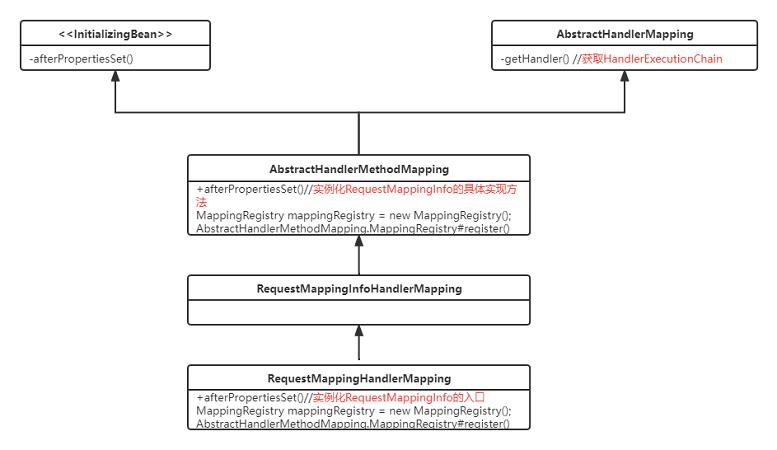SpringMVC--@RequestMapping注解标注方法解析
Posted chenzw93
tags:
篇首语:本文由小常识网(cha138.com)小编为大家整理,主要介绍了SpringMVC--@RequestMapping注解标注方法解析相关的知识,希望对你有一定的参考价值。
SpringMVC--@RequestMapping注解标注方法解析
本文是基于springboot进行源码追踪分析
问题
@RequestMapping注释的类及方法,Spring是何时,何种方式解析成url与方法的映射关系的?
背景
@RequestMapping注解的解析识别工作是由RequestMappingHandlerMapping类去完成的,会生成对应的RequestMappingInfo实例RequestMappingHandlerMapping类的位置是在org.springframework.boot.autoconfigure.web.servlet.WebMvcAutoConfiguration.EnableWebMvcConfiguration通过@Bean注解声明的org.springframework.context.support.AbstractApplicationContext#invokeBeanFactoryPostProcessors方法解析通过@Bean标记的方法,将对应对象转换为org.springframework.context.annotation.ConfigurationClassBeanDefinitionReader.ConfigurationClassBeanDefinition注册到org.springframework.beans.factory.support.DefaultListableBeanFactoryorg.springframework.beans.factory.support.DefaultListableBeanFactory#preInstantiateSingletons方法中实例化对象,并在org.springframework.beans.factory.support.AbstractAutowireCapableBeanFactory#invokeInitMethods方法中调用org.springframework.web.servlet.mvc.method.annotation.RequestMappingHandlerMapping#afterPropertiesSet方法实现@RequestMapping注解类及方法的解析与注册
org.springframework.boot.autoconfigure.web.servlet.WebMvcAutoConfiguration中定义了WEB MVC相关的自动配置类,就比如org.springframework.web.servlet.mvc.method.annotation.RequestMappingHandlerMapping、org.springframework.web.servlet.mvc.method.annotation.RequestMappingHandlerAdapter等等的实例化,
解析
类继承图

过程
在初始化RequestMappingHandlerMapping对象的时候,因为实现了org.springframework.beans.factory.InitializingBean#afterPropertiesSet方法,所以会调用org.springframework.beans.factory.support.AbstractAutowireCapableBeanFactory#invokeInitMethods方法时,会调用RequestMappingHandlerMapping#afterPropertiesSet方法。
// RequestMappingHandlerMapping类中相关代码
public void afterPropertiesSet()
this.config = new RequestMappingInfo.BuilderConfiguration();
this.config.setTrailingSlashMatch(useTrailingSlashMatch());
this.config.setContentNegotiationManager(getContentNegotiationManager());
if (getPatternParser() != null)
this.config.setPatternParser(getPatternParser());
Assert.isTrue(!this.useSuffixPatternMatch && !this.useRegisteredSuffixPatternMatch,
"Suffix pattern matching not supported with PathPatternParser.");
else
this.config.setSuffixPatternMatch(useSuffixPatternMatch());
this.config.setRegisteredSuffixPatternMatch(useRegisteredSuffixPatternMatch());
this.config.setPathMatcher(getPathMatcher());
// 调用父类的方法进行具体的解析
super.afterPropertiesSet();
在自身类的重写方法中进行了一系列的配置,同时调用了父类(org.springframework.web.servlet.handler.AbstractHandlerMethodMapping)的afterPropertiesSet方法,而具体的解析方法就在父类中。
// AbstractHandlerMethodMapping中相关代码
public void afterPropertiesSet()
initHandlerMethods();
/**
* Scan beans in the ApplicationContext, detect and register handler methods.
* @see #getCandidateBeanNames()
* @see #processCandidateBean
* @see #handlerMethodsInitialized
*/
protected void initHandlerMethods()
for (String beanName : getCandidateBeanNames())
if (!beanName.startsWith(SCOPED_TARGET_NAME_PREFIX))
//处理每个可能的bean
processCandidateBean(beanName);
handlerMethodsInitialized(getHandlerMethods());
protected void processCandidateBean(String beanName)
Class<?> beanType = null;
try
beanType = obtainApplicationContext().getType(beanName);
catch (Throwable ex)
// An unresolvable bean type, probably from a lazy bean - let\'s ignore it.
if (logger.isTraceEnabled())
logger.trace("Could not resolve type for bean \'" + beanName + "\'", ex);
// beanType上是否由@Controller或者@RequestMapping,如果有则说明是一个待解析的RequestMappingInfo
if (beanType != null && isHandler(beanType))
detectHandlerMethods(beanName);
protected void detectHandlerMethods(Object handler)
Class<?> handlerType = (handler instanceof String ?
obtainApplicationContext().getType((String) handler) : handler.getClass());
if (handlerType != null)
Class<?> userType = ClassUtils.getUserClass(handlerType);
//获取该handler内所有的Method与RquestMappingInfo映射关系
Map<Method, T> methods = MethodIntrospector.selectMethods(userType,
(MethodIntrospector.MetadataLookup<T>) method ->
try
return getMappingForMethod(method, userType);
catch (Throwable ex)
throw new IllegalStateException("Invalid mapping on handler class [" +
userType.getName() + "]: " + method, ex);
);
if (logger.isTraceEnabled())
logger.trace(formatMappings(userType, methods));
else if (mappingsLogger.isDebugEnabled())
mappingsLogger.debug(formatMappings(userType, methods));
methods.forEach((method, mapping) ->
Method invocableMethod = AopUtils.selectInvocableMethod(method, userType);
//按method将RequestMappingInfo进行注册
registerHandlerMethod(handler, invocableMethod, mapping);
);
在AbstractHandlerMethodMapping#detectHandlerMethods方法中,获取当前bean的所有method与RequestMapping映射关系,并进行注册。
现在继续看AbstractHandlerMethodMapping#getMappingForMethod,根据方法名即可猜测,这里就是通过method获取RequestMappingInfo,具体的实现方法在RequestMappingHandlerMapping#createRequestMappingInfo
// org.springframework.web.servlet.mvc.method.annotation.RequestMappingHandlerMapping#getMappingForMethod实现代码
/**
* Uses method and type-level @@link RequestMapping annotations to create
* the RequestMappingInfo.
* @return the created RequestMappingInfo, or @code null if the method
* does not have a @code @RequestMapping annotation.
* @see #getCustomMethodCondition(Method)
* @see #getCustomTypeCondition(Class)
*/
@Override
@Nullable
protected RequestMappingInfo getMappingForMethod(Method method, Class<?> handlerType)
// 根据method创建对应的RquestMappingInfo
RequestMappingInfo info = createRequestMappingInfo(method);
if (info != null)
// 如果方法所在类上也标注了@RequestMapping,则创建类对应的RequestMappingInfo
RequestMappingInfo typeInfo = createRequestMappingInfo(handlerType);
if (typeInfo != null)
// 将类与方法的requestMappingInfo进行合并,可以理解为获取完整的url路径
info = typeInfo.combine(info);
String prefix = getPathPrefix(handlerType);
if (prefix != null)
info = RequestMappingInfo.paths(prefix).options(this.config).build().combine(info);
// 返回完整url的RequestMappingInfo对象
return info;
获取到对应的RequestMappingInfo之后,就需要进行注册了,下面看注册逻辑org.springframework.web.servlet.handler.AbstractHandlerMethodMapping#registerHandlerMethod
public void register(T mapping, Object handler, Method method)
this.readWriteLock.writeLock().lock();
try
// 根据方法生成对应的HandlerMethod,包含了method对应的bean实例,对应的method
HandlerMethod handlerMethod = createHandlerMethod(handler, method);
// 校验url路径是否有重复,如果重复会抛出异常
validateMethodMapping(handlerMethod, mapping);
Set<String> directPaths = AbstractHandlerMethodMapping.this.getDirectPaths(mapping);
for (String path : directPaths)
this.pathLookup.add(path, mapping);
String name = null;
if (getNamingStrategy() != null)
name = getNamingStrategy().getName(handlerMethod, mapping);
addMappingName(name, handlerMethod);
CorsConfiguration corsConfig = initCorsConfiguration(handler, method, mapping);
if (corsConfig != null)
corsConfig.validateAllowCredentials();
this.corsLookup.put(handlerMethod, corsConfig);
//MappingRegistration包含RequestMappingInfo、HandlerMethod等
//Map<T, MappingRegistration<T>> registry = new HashMap<>();
this.registry.put(mapping,
new MappingRegistration<>(mapping, handlerMethod, directPaths, name, corsConfig != null));
finally
this.readWriteLock.writeLock().unlock();
总结
-
契机:给需要暴漏接口的方法、类上添加
@RequestMapping注解 -
时机:由于
org.springframework.web.servlet.mvc.method.annotation.RequestMappingHandlerMapping间接实现了org.springframework.beans.factory.InitializingBean#afterPropertiesSet方法,所以在RequestMappingHandlerMapping对象初始化的时候,会调用自身的org.springframework.web.servlet.mvc.method.annotation.RequestMappingHandlerMapping#afterPropertiesSet方法,自身进行一系列配置之后,就会调用父类org.springframework.web.servlet.handler.AbstractHandlerMethodMapping#afterPropertiesSet的方法进行@RequestMapping标注方法的解析 -
解析:主体流程都是在
AbstractHandlerMethodMapping类中的方法,具体的实现通过抽象方法的形式让子类RequestMappingHandlerMapping进行实现。具体根据method生成对应的RequestMappingInfo是在RequestMappingHandlerMapping类中的方法org.springframework.web.servlet.mvc.method.annotation.RequestMappingHandlerMapping#getMappingForMethod。过程中会先解析标注了@RequestMapping的方法,生成方法对应的RequestMappingInfo实例;如果方法所在的类上也有@RequestMapping标注的注解,生成类对应的RequestMappingInfo实例,然后将两者进行合并,也就是生成完整的url映射对象 -
注册:在解析完所有的方法之后,将
RequestMappingInfo进行注册,注册容器位于AbstractHandlerMethodMapping类中,容器为MappingRegistry mappingRegistry = new MappingRegistry(),而MappingRegistry中实际存储的容器为Map<T, MappingRegistration<T>> registry = new HashMap<>()。其中key为对应的RequestMappingInfo,value为MappingRegistration,其中MappingRegistration包含了RequestMappingInfo、HandlerMethod
以上是关于SpringMVC--@RequestMapping注解标注方法解析的主要内容,如果未能解决你的问题,请参考以下文章